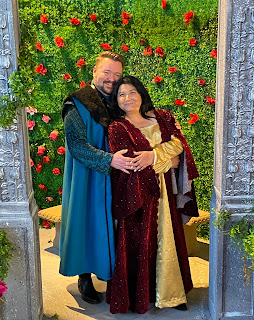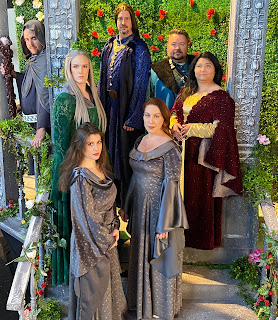 |
| The opening scene of Iolanta in Pacific Opera Project's production. |
REVIEW
Tchaikovsky’s “Iolanta,” Pacific Opera Project, Aratani Theatre, Los Angeles
DAVID J BROWN
 |
| Pyotr Ilyich Tchaikovsky around the time of Iolanta's composition. |
So whence Iolanta? The success of Tchaikovsky’s ballet The Sleeping Beauty at the Mariinsky Theatre in St. Petersburg, following its premiere there in January 1890, prompted Ivan Vsevolozhsky, Director of the Imperial Theatres (which included the Mariinsky) to suggest another collaboration with the composer. This time it was to be a double-bill of a ballet and an opera, and after casting around for subjects, plans settled on an adaptation in one act of the drama Kong Renés Datter, by the Danish poet Henrik Herz, and a two-act ballet drawn from E. T. A. Hoffman’s story Nussknacker und Mausekönig.
The rest is, of course, history. Although the original production was not a success, The Nutcracker went on to become a global smash-hit and to this day the go-to Christmas outing treat for innumerable families worldwide, but conversely Iolanta has shared the relative neglect of all of Tchaikovsky’s operas apart from Eugene Onegin and The Queen of Spades. For example, it did not reach the New York Met until 2015, and the current POP production is its first-ever staging in Los Angeles.
 |
| Ben Werley, tenor (Vaudémont), and Cristina Jones, soprano (Iolanta). |
King René seeks out and brings a healer to the garden, but the latter avers that his skills may only work if Iolanta realizes that she is blind, and desires strongly see. Meanwhile two knights find their way into the garden by accident; one of them, Count Vaudémont, falls for Iolanta, comes to understand that she doesn’t know that she is blind, through his love becomes the catalyst for the recovery of her sight—and they live happily, etc., etc.
POP’s opera ventures are maybe best known for imaginative and sometimes hilarious updatings (the ostrich farm mise-en-scène for the open-air Bizet Don Procopio at Heritage Square Museum lingers in the mind), but any concerns that the heroine might be seen to wield a braille cellphone or her beloved-to-be arrive, say, on an urban scooter were quickly allayed.
 |
| Josh Shaw, Producer/Designer. |
The cast were dressed as handsomely as was the stage, with costumes by designer Maggie Green inspired by The Lord of the Rings movies, so that the Martha of Megan Potter (contralto), nursemaid to Iolanta, and King René, sung by Andrew Potter (bass), carried more than a passing hint respectively of Cate Blanchette’s Galadriel and Hugo Weaving’s Elrond, while Andrew Allan Hiers (bass-baritone) as the healer seemed to be positively channeling Gandalf, clad in grey robes and brandishing a staff as weighty as Ian McKellen’s—the only thing missing was the pointy hat.
 |
| Andrew Allan Hiers (Healer) and Megan Potter (Martha). |
Recent POP productions like Don Procopio and Hansel and Gretel at Forest Lawn have economized heavily on instrumental resources, but here those mere handfuls of players were replaced by a band, ably conducted by Isaac Selya, that went a considerable way towards meeting Tchaikovsky’s full (but medium-sized) orchestral requirements.
 |
| Isaac Selya, Conductor. |
 |
| Andrew Potter (King René), center, with other cast members including Brooke Iva Lohman and Danielle Marcelle Bond, below. |
I suppose it must be acknowledged that Iolanta has neither a great deal of rhythmic variety in its music nor of dynamic action or plot machinations on the stage, but what it does have, which more than tips the balance, is Tchaikovsky’s apparently inexhaustible fund of melodic appeal. When this is relished and projected to the full by all concerned, as it was by the POP forces, any such potential weakness fades to nothing and the opera becomes a radiant 100-minute span that enchants throughout and nowhere threatens to sag.
Finally, it should be noted that POP has partnered with low-sight organizations for this production to encourage awareness and to amplify their efforts. Special arrangements are made for low-sighted audience members, including braille programs. Go and see it while you still can!
---ooo---
Pacific Opera Project, Aratani Theatre, Japanese American Cultural & Community Center, Los Angeles, 3 p.m., Sunday, March 20, 2022.
Images: Production photos: Martha Benedict; Tchaikovsky: Wikimedia Commons.

No comments:
Post a Comment
Note: Only a member of this blog may post a comment.